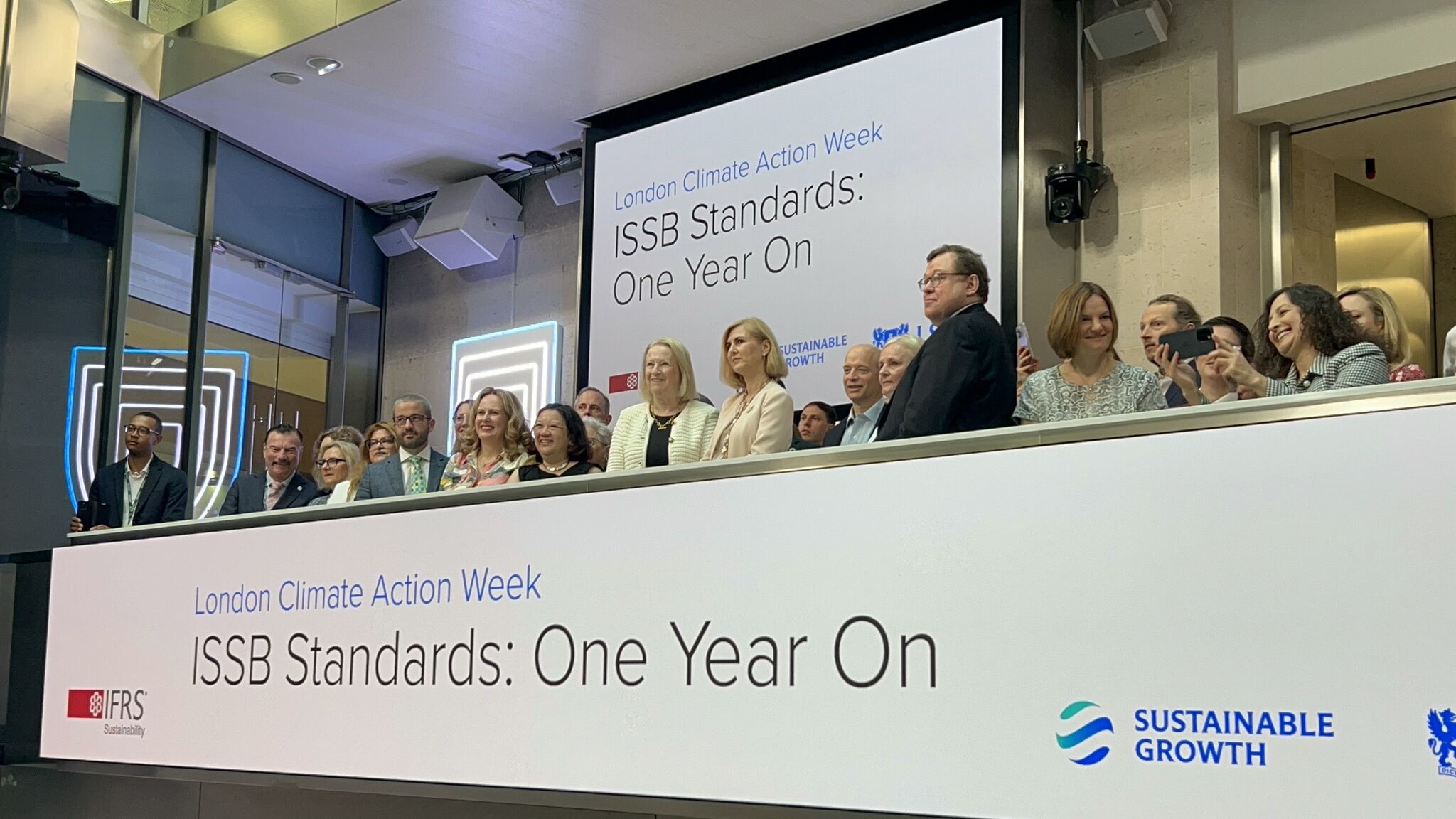IFC and IFRS Foundation Announce Partnership to Improve Sustainability Reporting in Emerging Markets

London, England, June 27, 2024 - The International Finance Corporation (IFC), a member of the World Bank Group, and the IFRS Foundation have signed a Memorandum of Understanding agreeing on their strategic partnership to strengthen sustainable capital markets by improving sustainability and climate reporting in emerging markets and developing economies (EMDEs). The collaboration was announced during London's Climate Action Week.
“Today marks a pivotal moment as we join forces with the IFRS Foundation in advancing sustainability and climate reporting,” said Martine Valcin, IFC Global Manager, Corporate Governance and ESG Advisory, Knowledge and Learning. “Our combined efforts are set to drive significant strides in standardizing and enhancing transparency, ensuring that EMDEs are not left behind in the global shift towards sustainable finance.”
The IFRS Foundation’s International Sustainability Standards Board (ISSB) issued two inaugural Standards in June 2023 with the objective of delivering global consistency and comparability of sustainability-related financial disclosures for capital markets. Jurisdictions making up around 55% of global gross domestic product are already taking steps towards using these Standards.
The partnership will focus on implementing programs to promote and build capacity for the consistent application of the IFRS Sustainability Disclosure Standards across EMDEs. This includes developing toolkits and research publications as well as conducting training programs to encourage sustainability reporting. Further, the partnership outlines plans to provide technical assistance and tailored support to help jurisdictions adopt and implement these Standards effectively, building on IFC’s successful initiatives already in Bangladesh and Jordan.
“We are proud to collaborate with IFC, uniting our commitment to high-quality sustainability and climate-related financial reporting with their deep market insights and global reach,” mentioned Jingdong Hua, Vice-Chair of the ISSB “This partnership will expand our impact, helping enhance the quality of sustainability and climate-related financial reporting worldwide, especially in emerging markets and developing economies. It plays a critical role in bringing structured and reliable sustainability information to the forefront of global markets, facilitating investments.”
This collaboration builds on IFC's extensive efforts through initiatives such as the Beyond the Balance Sheet program and the Sustainable Banking and Finance Network (SBFN). The Beyond the Balance Sheet program has been pivotal in providing advisory services to improve sustainability and climate-related reporting in EMDEs, aligning with the new IFRS Sustainability Disclosure Standards and the European Sustainability Reporting Standards. The Sustainable Banking and Finance Network (SBFN), facilitated by IFC as its secretariat, is a global knowledge-sharing and capacity-building platform on sustainable finance for financial sector regulators and industry associations in EMDEs.
This partnership is a commitment to future-proof financial markets against environmental risks, support the private sector’s ability to seize opportunities to evolve towards more resilient business models, and to promote the transparency that global investors and stakeholders increasingly demand.
About IFC
IFC — a member of the World Bank Group — is the largest global development institution focused on the private sector in emerging markets. We work in more than 100 countries, using our capital, expertise, and influence to create markets and opportunities in developing countries. In fiscal year 2023, IFC committed a record $43.7 billion to private companies and financial institutions in developing countries, leveraging the power of the private sector to end extreme poverty and boost shared prosperity as economies grapple with the impacts of global compounding crises. For more information, visit www.ifc.org.
About the IFRS Foundation
The IFRS Foundation is a not-for-profit organization created in 2001 to develop— in the public interest—high-quality, understandable, enforceable and globally accepted standards for general purpose financial reporting, and to promote and facilitate their adoption. The Standards—IFRS® Accounting Standards and IFRS® Sustainability Disclosure Standards—are collectively referred to as IFRS® Standards. They are set by the Foundation’s two independent standard-setting bodies, the International Accounting Standards Board (IASB) and the International Sustainability Standards Board (ISSB), using a rigorous, inclusive and transparent due process.
About Beyond the Balance Sheet
Beyond the Balance Sheet is an IFC-facilitated program that helps companies, banks, regulators, and stock exchanges develop sustainability and climate reporting necessary to remain relevant in a fast-changing and data-driven world. In particular, the online platform is designed to guide emerging-market companies on how to implement leading disclosure and transparency regulations and practices. This online ecosystem includes a digital toolkit, e-learning courses, self-assessment tools, and abundant sources to navigate the contemporary sustainability reporting landscape. The IFRS Foundation, the UN Sustainable Stock Exchanges Initiative, and IFC offer the first online training program on Applying the IFRS Sustainability. Disclosure Standards. To learn more visit https://www.ifcbeyondthebalancesheet.org/
About the Sustainable Banking and Finance Network
Established in 2012, the Sustainable Banking and Finance Network (SBFN) is a voluntary community of financial sector regulators, central banks, ministries of finance, ministries of environment, and industry associations from emerging markets committed to advancing sustainable finance. The first global network of its kind focused on sustainable finance at market level, SBFN comprises 93 member institutions representing 71 countries and at least US$68 trillion (92 percent) of the total banking assets in emerging markets, as of June 2024. SBFN provides tools, resources, and technical assistance to help members design and implement country-specific initiatives that advance sustainable finance at national, regional, and global levels. For more information, visit https://www.sbfnetwork.org/